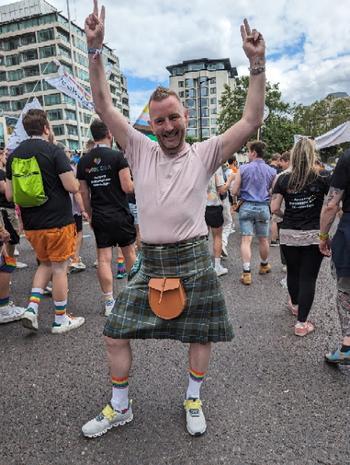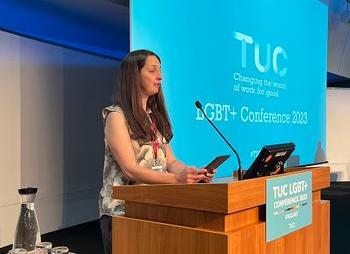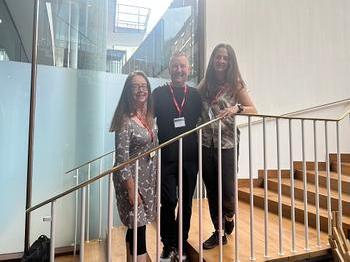TUC LGBT+ conference 2023
Guidelines being drawn up by the NUJ’s Ethics Council will be supported by the TUC LGBT committee and other unions, following a debate at the TUC LGBT+ conference.

James Doherty, the NUJ's first openly gay president on the London Pride parade.
James Doherty, NUJ delegate, told conference that he had been the NUJ’s first openly gay president, and said he was not there to defend bad journalism or transphobic commentary. He recalled the attacks on gay men during the 1980s and 1990s and said: “We cannot stand by and let history repeat itself.”
He said: “The NUJ has a code of conduct and ethics which is our cornerstone. That’s not to say that all journalists or outlets sign up to that, but it does provide a guide and a support for any journalist who is asked to write something they do not agree with. The NUJ Ethics Council’s is working to provide guidance for journalists and content creators with a view to ensuring the information they use is accurate. We want to do everything we can to prevent misinformation that can add to misunderstanding, fear and contribute to transphobia. Colleagues, please let’s find a way to take the hate out of this debate,” he added.
James began his speech saying: “Let me begin by stating loud and clear that trans rights are human rights. Their right to exist, live, thrive, love and participate equally in our society should never be up for debate.”
The motion followed one from the Musicians’ Union (MU) whose delegate won a standing ovation after explaining that she was unable to express her sexuality openly. She said that after a five-year relationship with a same-sex partner ended she was heartbroken, but was unable to seek emotional support because she could not discuss it with her family or many of her friends. She said it was important to have laws that gave stronger protection to workers going through gender affirmation. Having strong laws can led to a change in culture, she said recalling how amazed she was to see same-sex people publicly expressing affection while she was living in Boston. It was soon after same-sex marriage was made legal.

The MU motion, which called on unions to challenge organisations hostile to trans and non-binary people and to create best practice guides to create safer workplaces for LGBT+ workers, was seconded by Natasha Hirst, president of the NUJ. She spoke up for freelance workers, saying: “Our workplace can change from day to day. We might be working with people we know or people we’ve never met. We often work anti-social hours and sometimes we have no clue what kind of environment we are stepping into when we go off to work. It makes it really hard to be your whole self.”
She recommended the MHFA England’s My Whole Self campaign which provides tools to create psychologically safe workplaces where people are seen, heard and valued, and which embraces all identities in an intersectional way. She said:
“Everyone should feel safe to approach their union for advice, support and representation without needing to hide who they are. We need every single union rep to be an ally to trans and non-binary people. Every member should know that their voice and their concerns are being listened to from the bottom to the top of our unions.”
Research published by the TUC showed that homophobia, biphobia and transphobia still alive in UK workplaces – with workers describing feeling “lucky” if they had inclusive managers and colleagues, and “grateful” when basic equality standards were met. Delegates at conference backed this up from their own experiences and those from the teachers’ unions said they found themselves on the frontline when dealing with issues concerning young trans and non-binary pupils. This was while many LGBT+ teachers were also experiencing discrimination from colleagues, parents and their students.
The TUC had to put out a tweet in support of a member of staff who had been subjected to anti-trans abuse online, because she is a mother. “This is unacceptable. Everyone should be safe and respected at work,” it said.
Conference heard that LGBT+ workers are being disproportionately hit hard by the cost-of-living crisis as the LGBT+ pay gap – or as one delegate dubbed it the Queer Pay Gap – is 16 per cent, meaning that workers are bringing home £6,700 less than non-LGBT+ workers with a fifth of workplaces not having policies in place to support LGBT+ employees.
They also had to overcome discrimination, hostility and unequal treatment when accessing healthcare services. This was often because health workers needed more training, one delegate said. Those waiting for gender affirming treatment experienced a long wait for NHS treatment. Delegates welcomed a change from the government in a draft bill to ban conversion therapy, which will now include protection for transgender people – the TUC was called on to monitor the legislation. The right-wing media under the guise of ‘culture wars' was fuelling attacks against LGBT+ artists, notably drag queens leading to loss of income for many, conference was told.
A Royal College of Podiatry motion called on the TUC LGBT committee to encourage research into “the impact of gender fluidity or transition into the biomechanical function of feet and the footwear that accommodate them” and to pursue the problem as a workplace and health and safety issue. Conference agreed to a campaign for a statutory duty giving equality reps the same right to take time out for their union duties as shop stewards and safety reps.
The rise of the far right was leading to a backlash to progressive policies favouring LGBT+ people said Olivia Blake MP for Sheffield Hallam. “Across the United States we have seen shootings at LGBT+ venues alongside legislative attacks on queer culture and performance spaces.” She cited Poland, Hungary, Australia and Italy as countries which are stripping back the rights of LGBT+ people. “I wish the UK bucked the trend,” she said, “but we have seen the same vitriol against LGBT+ people coming from newspaper editorials, radio programmes and – shamefully – the government despatch box in the House of Commons chamber.”
An emergency motion highlighted what has been happening in Turkey and Uganda and delegates heard how during his presidential campaign Recep Tayyip Erdoğan missed no opportunity to attack gay and trans people. “We are against the LGBT,” he told one rally near the Black Sea, adding that in Turkey the family “was sacred”. Uganda has signed into law an anti-homosexuality law which includes the death penalty. There are 64 countries that have laws that criminalise homosexuality, and nearly half of these are in Africa. One delegate noted that many of these laws date from colonial times.

Ann Galpin, James Doherty & Natasha Hirst
Ann Galpin, NUJ delegate, speaking to the emergency motion, said LGBT+ journalists work around all the world, including in countries hostile to their rights. She said: “The NUJ aims to support and educate our members who are reporting on human rights issues and to give a voice to LGBT+ people and others, especially refugees, who are incredibly marginalised.”
Conference also heard from Maria Exall, the TUC’s first “out” president. Kate Bell, TUC assistant general secretary, said of her: “She’s not only someone who has devoted her life to the struggle for equality, but also a proud trans ally who stands shoulder to shoulder with our trans and non-binary siblings and who was instrumental in supporting our new Trade Unions for Trans Rights Network” She went on to blame the far right for a backlash against LGBT+ rights saying:
“ For all the progress we have made, I sense we are at a tipping point. Funding for LGBT + services, and mental health services, has been slashed. Toxic narratives about LGBT people, and all minority groups, are flourishing. And the UK has been dropping like a stone down the ILGA rankings for LGBT+ equality. When the UN’s special representative Victor Madrigal visited the UK last month, he expressed real concerns about abusive rhetoric by politicians and the media and about hate speech, hate crime and the rise of the far right.”
